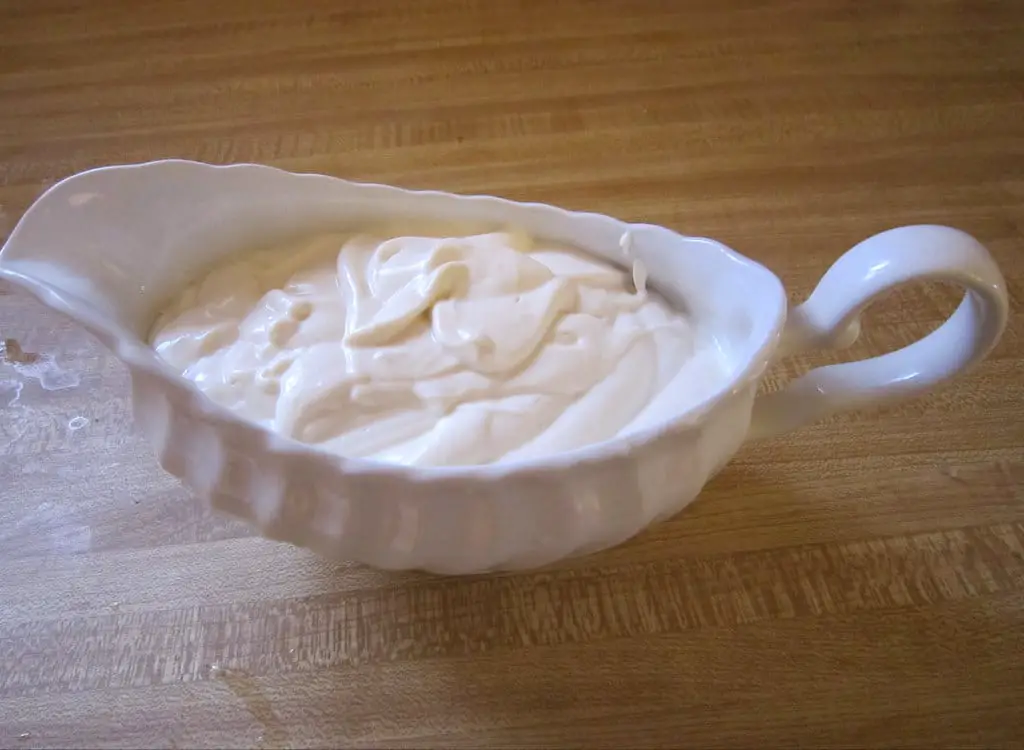
Can Babies Eat Sour Cream?
As responsible parents, we are naturally inquisitive on the foods that nourish our infants. We continuously ponder if it is safe to provide sour cream for babies. In this article, we will delve into whether young ones can consume sour cream and how risk-free it really is for them.
Can Babies Eat Sour Cream?
Babies can consume pasteurized sour cream in moderate portions at six months old. But here’s the rub: after adding live culture, sour cream undergoes another round of pasteurization, negating any probiotic benefits for a baby’s digestive system. So, if your aim is to introduce beneficial bacteria into your little one’s belly, yogurt is the way to go.
Related: CAN YOU HAVE BUBBLE TEA WHILE PREGNANT
Many adults love sour cream, and it’s commonplace on our tables. We add it to cakes, serve it with cheesecakes, or just eat it plain. But when a baby arrives at the family dinner table, many parents are curious about how much and how often they can give their children this product: is it beneficial in any way? Or could it be potentially dangerous?
Can I Add Sour Cream To Baby Food?
At 6 months old, your infant is ready to explore the world of solid foods—and that’s when adding a dollop of sour cream can make their meals more nutritious and delicious. Sour cream is not only packed with calories, but it’s also full of healthy fats too, so it helps your little one gain weight healthily.
Try stirring a spoonful into veggie or fruit purees for a creamy texture, mash it together with potatoes for an extra creamy addition, add it to soups for extra thickness, mix it in with breakfast cereals, and get creative by putting out some cooked vegetables and inviting your child to dip them in the sour cream.
How to Introduce Sour Cream to Babies
When introducing sour cream to infants, the safest approach is to initiate small doses mixed in with their typical meals. Blend a teaspoonful of this dairy product into mashed potatoes or provide it as a dip for vegetables and your baby will be able to experience the unique taste without being excessively bold on their taste buds.
If your little one does not display any signs of allergy or discomfort after trying it out, you can gradually elevate the amount of sour cream in their diet. Just remember that they should never substitute breastmilk or formula with this food choice; both are still required to guarantee a sufficient intake of vital nutrients.
Soured Cream Substitutes For Babies
It’s not recommended to give babies under 12 months old dairy products like soured cream – their delicate digestive system just isn’t ready for it. Instead, opt for nutrient-dense, easy-to-digest options devoid of allergens and other potential health risks.
But what if you want something akin to soured cream? No problem. Simply reach for plain yogurt instead; its tangy flavor and creamy texture are virtually indistinguishable from the original, though with a fraction of the fat content. If that doesn’t tickle your palate, then consider blending silken tofu for a protein-powered alternative or coconut cream for a subtly sweet switch up. And don’t forget about mashed avocado, which comes with an added dose of healthy fats.
At the end of the day, however, always remember to consult a pediatrician when introducing new foods and ingredients into your baby’s diet – especially if they have food allergies or existing medical conditions.
Can Babies Eat Yogurt?
Babies can indeed have yogurt as part of their diet, but it is wise to wait until they are six months old before introducing it. Possessing a range of benefits, including protein, calcium, and probiotics – essential for their growth and health – plain and unsweetened yogurt should be opted for.
Related: IS MS. RACHEL GOOD FOR BABIES
Keep away from options with added sugars or artificial flavors, as they could carry an excessive calorie content and increase the risk of tooth decay. It’s important to remember that each new food should be tried one-by-one to watch out for any allergies.
If your baby has a history of dairy-related issues or lactose intolerance, discuss this with their pediatrician beforehand. Yogurt can be served up as its own snack or mixed together with pureed fruits and vegetables for additional flavor and nutrition. Be sure always to provide supervision during feeding times – never abandon your infant whilst eating.
Can a 9-month-old Have Cream?
Yes. Babies require high concentrations of fat from the start, so it’s prudent to feed them whole milk until they’re two years old. Afterward, children should continue to consume full-fat dairy for nutrition until, at least, five years old. Skimmed and reduced-fat varieties should be avoided since young bodies need the calories; yet a bit of cream won’t do any harm unless there are lactose sensitivities present